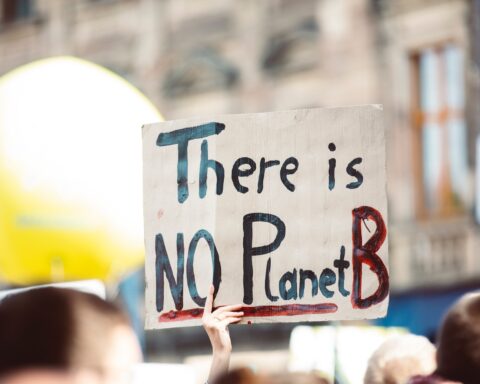“We have lived our lives by the assumption that what was good for us would be good for the world…. We have been wrong. We must change our lives so that it will be possible to live by the contrary assumption, that what is good for the world will be good for us. And that requires that we make the effort to know the world and learn what is good for it.”
—Wendell Berry, The Long- Legged House

No one can deny it: since the 222nd General Assembly the Mission Responsibility Through Investment (MRTI) team has been busy with the Fossil Fuel Companies. MRTI has engaged in dialogues, filed shareholder resolutions, and established Guideline Metrics to measure progress.1 There is a whole lot of busyness at MRTI these days. Now we learn that MRTI has joined Climate Action 100+. This coalition of investors is engaged in a five-year initiative that focuses on the 100 companies that are the biggest emitters of greenhouse gases. The claim is that “If companies do not show progress within five years or less of engagement, they will face escalated reputational and financial pressure, including divestment […]”. 2
___________________________________________
“Engagement” with the fossil fuel companies is the exact opposite of being with the poor. Engagement means endorsing the status quo.
___________________________________________
Has MRTI not listened to one word the 40 concurring Presbyteries have said in Overture 08-01 about climate change? For me and a lot of other Presbyterians the institutional church is ignoring catastrophe—not one that is going to happen, but one that is happening right now. Our children, our grandchildren, and all of creation are facing mass destruction and extinction while the Presbyterian Church is recommending a “middle road” approach of continued engagement with the fossil fuel companies, an approach that will take five years! Meanwhile, worldwide it is estimated that millions of environmental refugees have already lost their homes and ways of life.
MRTI insists that Exxon and other fossil fuel companies are cooperating. But how could they? Exxon is a fossil fuel company! Fossil fuel companies are about fossil fuels – they may budge a bit in response to public pressure, but they are unlikely to change their stripe, since it is the very nature of that industry to promote fossil fuels.
Environmentalist and author Bill McKibben addresses the issue of engaging with the fossil fuel companies in a recent issue of Rolling Stone. McKibben critiques Thomas DiNapoli, the powerful NY state comptroller, stating:
“He’s continuing to invest billions of pension dollars in big oil, even as the fossil fuel industry refuses to grapple seriously with global warming. Because of his high-profile insistence on ‘engagement’ with the industry”, the figurehead has become a “stand-in for a thousand other political ‘leaders’ who can’t quite summon the nerve necessary to break with the fossil-fuel industry, even when science and economics are making it clear where the future must lie. It’s so much easier to keep doing what you’ve always done – but at this point inertia is the planet’s most powerful enemy.” 3
What McKibben said of the DiNapoli can be equally applied to MRTI’s position.
When he addressed our presbytery about the 08-01 divestment overture, Rev. Jeff Geary explained why divestment is a necessary tool. While there are uncertainties in climate science, they pertain to questions like “When will we reach the point of no return on melting ice, acidifying oceans, and spreading deserts?” Not to whether these things will happen. And current corporate action is accelerating this catastrophe at an alarming rate.
Divestment alone will not be enough. But it is a crucial tool within a larger global effort to push both corporations and governments to respond to their people’s cries for change.
Divesting from fossil fuels does three principal things:
1. It strips legitimacy from an industry whose business plan means suicide for the planet.
2. It frees up funds for investing in other forms of energy.
3. It builds momentum for other actions including pressure on governments to do what only governments can do – like enforcing international accords on Climate Change or raising emissions standards or protecting preserves and other natural resources from exploitation.
The last, crucial thing that divestment does is require our own denomination, the PC(USA), to use its voice and power seriously in this global effort.” 4
MRTI claims it is mindful that it has been directed by the 222nd General Assembly to “locate ourselves with the poor, to advocate with all of our voice for the poor, and to seek opportunities to take risks for and with the poor.” 5
But “engagement” with the fossil fuel companies is the exact opposite of being with the poor. Engagement means endorsing the status quo. It means supporting investors and ignoring the right of future generations to a future. As Cynthia Scharf put it:
“We are passing on an enormous environmental debt to future generations, one that is incomparably more serious that any financial debt, and our global, fossil-fueled economy is causing significant harm right now for millions of the world’s poorest people. These are among the communities who have contributed the least to climate change, but are suffering first – and worst – from its impacts.” 6
MRTI policy relies heavily on the Paris Accord. But the Paris Accord is non-binding. It sets limits, but does not specify how those limits will be monitored. The accord privileges us over future generations suggesting that we don’t have to change our lives now because nothing really bad will happen for another 30 years or so. Scharf described the Paris Accord in a class at Union Seminary in April 2018 as a “political miracle and scientific tragedy – everyone knew it was not nearly enough”. 7 Amitav Ghosh, in The Great Derangement, notes that the Paris Accord set the aspirational goal of limiting the rise in global mean temperature to 1.5 degrees Centigrade – a target that is widely believed to be already beyond reach. 8
If every individual must change behavior before we change systems, there is little hope.
MRTI would be better served to pay attention to the words of Pope Francis in Laudato Si’: On Care For Our Common Home, an encyclical letter that the 222nd General Assembly asked all Presbyterians to study and use. 9 Pope Francis states that technology based on the use of highly polluting fossil fuels needs to be progressively replaced without delay:
“As often occurs in periods of deep crisis which require bold decisions, we are tempted to think that what is happening is not entirely clear. Superficially, apart from a few obvious signs of pollution and deterioration, things do not look that serious, and the planet could continue as it is for some time. Such evasiveness serves as a license to carrying on with our present lifestyles and models of production and consumption. This is the way human beings contrive to feed their self-destructive vices: trying not to see them, delaying the important decisions and pretending that nothing will happen.”10
Later, the Pope continues:
“Doomsday predictions can no longer be met with irony or disdain… The pace of consumption, waste and environmental change has so stretched the planet’s capacity that our contemporary lifestyle… can only precipitate catastrophes…. The effects of the present imbalance can only be reduced by our decisive action, here and now. We need to reflect on our accountability before those who will have to endure the dire consequences.”11
We are all responsible for climate change. Every one of us needs to change our behavior. I admit to being part of the problem. I am a consumer of fossil fuels. As much as I try to make choices for the environment, I still drive a car, rely on Con Edison to heat my home, and jump on a Delta flight to get to GA. But if every individual must change behavior before we change systems there is little hope. As Ghosh reminds us:
“The scale of climate change is such that individual choices will make little difference unless certain collective decisions are taken and acted upon.” 12
So let’s not go down the road of ‘until we all make personal changes we can’t expect corporations and governments to change’. The PC(USA) can make an important change at the 223rd General Assembly by voting for divestment. This act will influence synods, presbyteries, congregations and individuals to divest.
If we follow MRTI’s lead we will be ignoring the biblical mandate to care for creation now. But if we vote for divestment, we will be voting for a future for those who come after us and for the environmental refugees who currently are already living through the ravages of climate change.
***
Author Bio: Kathy Dean is a Ruling Elder at White Plains Presbyterian Church in the Hudson River Presbytery. Since retirement Kathy has focused much of her time on volunteer environmental initiatives, including HRPGreen, the environmental partnership of the Hudson River Presbytery.
1 Item 08-08 “Mission Responsibility Through Investment Report.” 223rd General Assembly, PC(USA). 2018.
2 Stephen Webb, “Climate Action 100+:Amplifying MRTI’s Voice” Justice Unbound. May 29, 2018. https://justiceunbound.org/carousel/climate-action-100-amplifying-mrtis-voice/
3 Bill McKibben, “Hit Fossil Fuels Where it Hurts – the Bottom Line.” Rolling Stone. May 21, 2018 Accessed May 22, 2018 https://www.rollingstone.com/politics/news/mckibben-hit-fossil-fuels-where-it-hurts-the-bottom-line-w520337
4 Jeffrey Geary, “PC(USA: Divest from Fossil Fuels.” Accessed 5/28/18. https://revgeary.wordpress.com/2017/07/26/pcusa-divest-from-fossil-fuels/
5 PC(USA). 222nd GA Minutes, 2016, Part I, p. 700.
6 Cynthia Scharf, “To Whom Much is Given.” Presbyterians for Earthcare. Accessed 4/30/18. http://presbyearthcare.blogspot.com/2018/04/to-whom-much-is-given-by-cynthia-scharf_15.html.
7 Cynthia Scharf, talk at Union Theological Seminary- NYC April 30, 2018.
8 Amitav Ghosh, The Great Derangement (Chicago: University of Chicago Press, 2016), 153.
9 “On Communicating Gratitude for and Study of the Encyclical “Laudato Si’.” 222nd PCUSA General Assembly, 2016.
10 Pope Francis, Laudato Si’: On Care for Our Common Home. (Huntington, IN: Our Sunday Visitor, 2015), 41.
11 Pope Francis , Laudato Si’, 107
12 Ghosh, The Great Derangement, 133.






Unbound Social